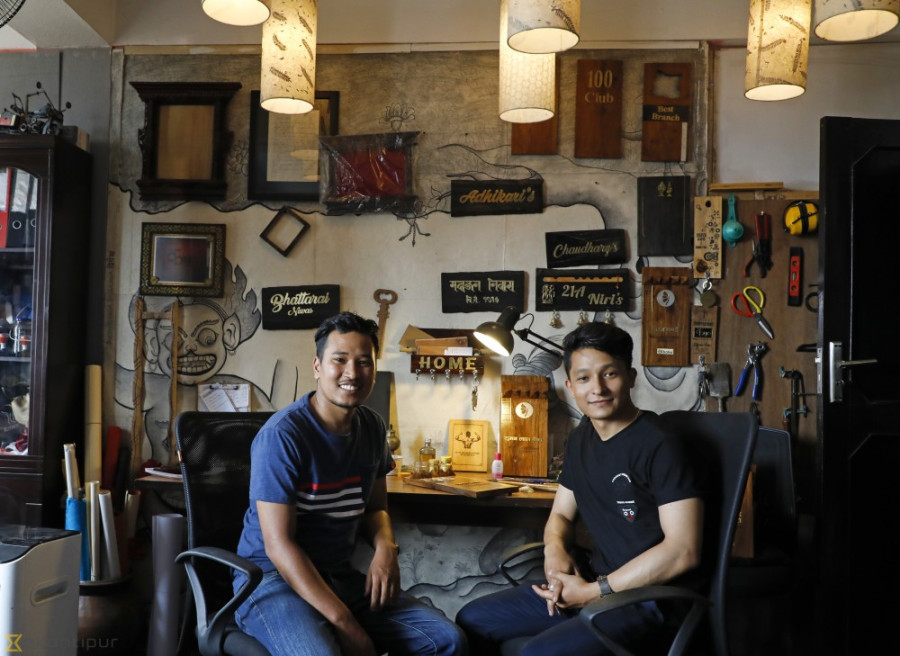Life & Style
The studio that wants to bring in a new wave of handicrafts
Two young, passionate entrepreneurs are trying to sustain the handicraft industry through new innovative techniques
Sachitra Gurung
Prasanna Kumar Shakya had always been fascinated with how small-scale handicraft businesses did so well for themselves. And how the demand for handicrafts—whether it be small leather keyrings or accessories—has always been there.
“I knew that if I would tap into the market, I’d do well and change how things worked. That’s how I got hooked to the idea of manufacturing handmade products in Nepal,” says Shakya. Teaming up with childhood friend Sajan Govinda Joshi two years ago, Shakya then established Kayo Creative Studio in May 2017.
The first thing the duo decided was that the studio would not follow the traditional business model of handicraft businesses exactly. The pair wanted to establish a luxury handicraft brand that produced everything from bow ties to pendants, to dog tags and trophies—all using silver, brass, wood, copper and paper. They wanted to expand their product base in order to open up more avenues for the handicraft industry in Nepal.
And their designs too would not be limited, Shakya says. “When it comes to products, Kayo doesn’t have any limitations. People come to us with their own designs and, if it’s doable, we materialise their designs, or we at least try to make something close to their original design,” he says.
Besides the custom-designed goods, Kayo, which means clay or white ceramic in Nepal Bhasa, has its own selection of products—designed and produced at their workshop in Manbhawan. “We are designing new products of our own that match the preferences of our target group, which is mainly the young generation,” says Joshi.
Apart from integrating innovative designs into their product line, the 26-year-olds also want to help sustain the handicraft industry in Nepal, which Shakya says is gradually losing its presence as foreign brands and imported goods are flooding the market. “We want to create a trusted, go-to brand for handicrafts in Nepal and at the same time help sustain the handicraft industry in Nepal,” he says.
Integral to Kayo Creative Studio is its desire to create jobs for Nepalis. While they started the company two years ago, a lack of skilled manpower, both in operations and manufacturing, had been one major difficulty for them. They now have seven employees, but attracting young talent is difficult, they say.
“There are a few skilled artisans left in Nepal, and a majority of them are older people. We tried training a few people, but most of them chose to immigrate after learning the skills,” says Shakya. He believes the young generation is brainwashed into thinking that making handicrafts isn’t a respectable and well-paying job.
“Nowadays everyone wants a fancy job. They want to buy handicrafts, but they don’t want to make them,” he says. In the future, the duo wants to establish an institution to train people in handicraft-making. If things go well for them, in the next five years, they also want to open a factory to create jobs in Nepal. “I don’t want people to see making handicrafts as a hobby. I’ve seen passionate and skilled people do that, and I want to create job opportunities for them,” he says.
Kayo Creative Studio does not yet have its own outlet, because it is difficult to showcase products that are most-often customised. However, the studio makes optimum use of social media. All products are displayed on their social media pages, where they directly connect with customers and sell their products. Kayo has a total of 13,600 followers on its Instagram page alone, an impressive sum for a Nepali handicraft business. Apart from social media, the handicraft business has also capitalised on e-commerce site Daraz.
However, gaining the trust of those potential customers online is tough, say the owners. “It’s difficult to explain the product through text messages, and I feel like it would be better if we could show them the product personally before they buy it. That’s why we are planning to open a physical outlet soon,” says Joshi.
For now, the young duo is determined to make Kayo a household name for gifts and souvenirs, while also enabling people’s creativity through customisation. “People are curious and come to us to turn their imaginations into finished products. We try to help as much as we can. Turning imagination into reality; that’s Kayo for you,” says Joshi.




 13.12°C Kathmandu
13.12°C Kathmandu










